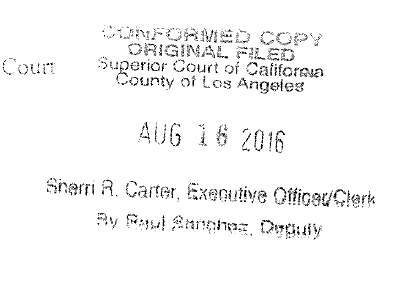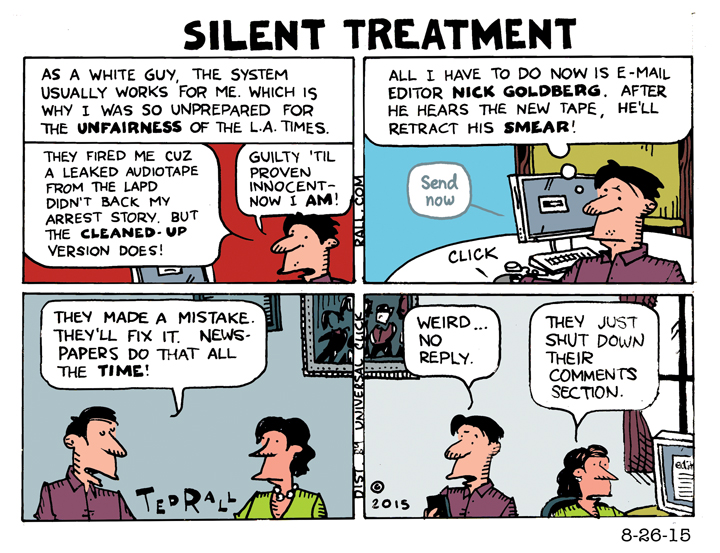My lawsuit against the Los Angeles Times is a long, complicated story. The following is an attempt to bring you up to speed in digestible form.
I became the staff cartoonist of the Los Angeles Times in 2009. Unbeknownst to me, in 2014 the LAPD Pension Fund became the biggest shareholder of Tribune Publishing, parent company of the Times. No one at the Times told me to lay off cartoons about the cops, probably because my editors too were unaware of the secret deal. In 2015 the Times fired me at the request of the LAPD.
The LA Times’ Nutty Audio
I was walking from a Bill Maher show taping to dinner in West Hollywood in October 2001 when an LAPD motorcycle officer confronted me, handcuffed me and roughed me up, drawing a crowd of passersby. He wrote me a ticket for jaywalking. I had not been jaywalking. I filed an Internal Affairs complaint about the false arrest but nothing came of it.
 In July 2015 a LA Times reporter informed me that the officer had secretly audiotaped my arrest, that the LAPD (actually, it was Police Chief Charlie Beck, see below) had given the Times (actually, to publisher Austin Beutner, see below) the tape and that the tape showed I had lied about being handcuffed and mistreated by the cop in a 2015 blog that was posted with a cartoon that I did for the Times about an LAPD jaywalking crackdown.
In July 2015 a LA Times reporter informed me that the officer had secretly audiotaped my arrest, that the LAPD (actually, it was Police Chief Charlie Beck, see below) had given the Times (actually, to publisher Austin Beutner, see below) the tape and that the tape showed I had lied about being handcuffed and mistreated by the cop in a 2015 blog that was posted with a cartoon that I did for the Times about an LAPD jaywalking crackdown.
The sound quality is atrocious. It’s 6-1/2 minutes of static, wind and traffic noise. There is evidence that it was spliced or otherwise tampered with. The LAPD audio neither confirms nor denies my account, which was truthful. Nevertheless, the Times decided to terminate me AND to publish a libelous “Editor’s Note” to readers intended to destroy my reputation as a journalist so that I would never work again.
I had the audio “enhanced”—cleaned up so that voices and other sounds could be heard. The enhancement confirmed my version of the encounter, including a woman shouting “Take off his handcuffs!” at the officer. I sent the vindicating evidence to my editors at the Times. They ignored me.
The Times Doubles Down
Three weeks passed. During this time, pressure built on the Times to reverse their decision. Journalistic organizations, Times subscribers commenting on their website, letter writers and social media from left to right urged the Times to reinstate me. They refused questions from reporters at other press outlets, censored the letters and shut down online comments at latimes.com. Thanks to the enhanced audio, the Times knew it had libeled me in the Editor’s Note. Rather than issue a retraction and offer me back my job, the Times issued a second article, this one by the Times’ ombudsman, that doubled down on the allegations from the first article, which they knew to be false.
My Lawsuit
I waited seven months for the Times to do the right thing. Finally, in 2016, I sued the Times, its parent company Tribune, and four individuals for defamation and wrongful termination. I am determined to defend my reputation against these scurrilous smears.
Here are the individual defendants:
Austin Beutner
Times publisher at the time, hedge-fund multi-billionaire Austin Beutner was subsequently fired by Tribune for trying to orchestrate an inside-the-boardroom coup. Beutner secretly met with LAPD Chief Charlie Beck, who subsequently resigned in disgrace. At this meeting Beck handed Beutner the audio recording from 2001. Beck demanded that I be fired for criticizing the police in my cartoons; Beutner, Beck’s political ally and a man who’d like to run for mayor or governor, complied. (The Times still hasn’t told readers where the audio came from.) Beutner is currently the superintendent of the Los Angeles public school district, the largest in the country. His refusal to give teachers a raise prompted an acrimonious walkout by educators.
Nicholas Goldberg
Times editorial page editor Nicholas Goldberg, a middle manager, appears not to have been trusted with inside knowledge of the high-level conspiracy between Beutner and Beck. It’s hard to know anything for sure before the courts grant discovery, but Goldberg’s role was likely limited to that of hatchet man: his by-line is on the Editor’s Note.
Paul Pringle
Bypassing Goldberg, Beutner probably assigned Times investigative reporter Paul Pringle to look into my story. Pringle informed me that the LAPD was accusing me of lying and questioned me at length about what happened the evening of the jaywalking arrest. Pringle, who worked the “cop shop” beat for years and thus spent a lot of time with police, made clear that he believed the cops, not me. Among other silliness, he asked why the low-quality audio didn’t contain the sound of my driver’s license (made of paper) hitting the ground after the officer tossed it or the click of the handcuffs going on. He also wondered why there was no sound of me arguing with the officer; I repeatedly explained that I was compliant, that I don’t argue with cops. In order to determine the authenticity of the LAPD audio, he told me, he asked the LAPD if it was legitimate. Pringle won the 2019 Pulitzer Prize for Investigative Journalism.
Deirdre Goebel Edgar
Until 2018 Deirdre Goebel Edgar was the “Reader’s Representative” of the Times. The reader’s representative is the ombudsman of a newspaper; though paid by the paper her duty is akin to Internal Affairs at a police agency: to make sure the paper is upholding journalism’s highest ethical standards in service to readers. Indeed, in 2014 she authored the Times’ Ethical Guidelines. Among other things, the guidelines require that the subject of a critical story be interviewed at length, in person, to give their side. Edgar wrote the second “doubling down” article in 2015 smearing me as a liar. She did not contact me.
The Times Hits Me With an Anti-SLAPP Motion
 California’s anti-SLAPP (strategic lawsuit against public participation) law was designed to stop individuals and whistleblowers from being slammed by big corporations like real estate developers out to crush community activists by tying them up in court with frivolous defamation claims. After I sued the Times, Kelli Sager—a high-powered $715/hour attorney employed by such reputable enterprises as the National Enquirer to fend off legitimate libel lawsuits—hit me, a fired $300/week cartoonist, with an anti-SLAPP motion alleging that I was using my power and influence to deprive the Times of its First Amendment free speech rights. The Times is currently owned by Dr. Pat Soon-Shiong, who is reportedly worth $7 billion. Soon-Shiong gets a lot of good press that he doesn’t deserve; he has continued to employ Sager.
California’s anti-SLAPP (strategic lawsuit against public participation) law was designed to stop individuals and whistleblowers from being slammed by big corporations like real estate developers out to crush community activists by tying them up in court with frivolous defamation claims. After I sued the Times, Kelli Sager—a high-powered $715/hour attorney employed by such reputable enterprises as the National Enquirer to fend off legitimate libel lawsuits—hit me, a fired $300/week cartoonist, with an anti-SLAPP motion alleging that I was using my power and influence to deprive the Times of its First Amendment free speech rights. The Times is currently owned by Dr. Pat Soon-Shiong, who is reportedly worth $7 billion. Soon-Shiong gets a lot of good press that he doesn’t deserve; he has continued to employ Sager.
Before the case begins, the anti-SLAPP motion must be resolved. First up: the trial court.
Superior Court
At trial court in Los Angeles, the Times filed a motion for summary judgement against me, arguing my claim to be frivolous. The judge at the time, who retired a few months later, denied the Times’ motion.
Switching tacks, Sager filed a motion demanding that I post $300,000 cash bond to guarantee the Times’ legal fees in the event that it won anti-SLAPP and won a judgement that required me to pay the Times’ attorneys’ fees, because I live in New York and not California. The judge knocked it down to $75,000. Hundreds of people contributed to my GoFundMe. I posted bond. Every year I pay the bond company $1250 to hold the money.
After a blizzard of stalling tactics by Sager, Judge Joseph Kalin heard the anti-SLAPP motion in 2017. Just days before the second and third of three anti-SLAPP arguments, attorney Carney Shegarian abruptly fired me as his client. I do not know why. I quickly found a new attorney but Judge Kalin ruled that I had to represent myself against Sager in oral arguments.
Anti-SLAPP requires judges not to assess the evidence, but to assume that all the claims are true to see if the complaint has any merit. Kalin assessed the evidence, agreed that the audio enhancement showed I was innocent, and nonetheless ruled against me. He ordered me to pay the Times $330,000 for Sager’s fees.
I appealed.
Court of Appeal
Earlier in 2019 the Court of Appeal, also in Los Angeles, heard my appeal. Like Kalin, the Court of Appeal ignored the anti-SLAPP rule about assessing evidence. During oral argument Justice Elizabeth Grimes, seemed shocked when my attorney Jeff Lewis brought it up. Grimes ruled for the Times.
I appealed. The California Supreme Court accepts fewer than 5% of petitions for review so I was pleasantly surprised when they agreed to hear my appeal. Seven major First Amendment organizations issued amicus letters supporting my appeal to the state Supreme Court.
My petition was a “grant and hold,” which means it’s tied to the outcome of a related case, in this situation Stanley Wilson v. CNN. Wilson claims he was wrongly terminated and defamed by CNN as a ruse, with the real reason being race discrimination.
California Supreme Court
The high court ruled in favor of Wilson in a ruling that urges lower courts to grant discovery in anti-SLAPP cases, something that was denied us. As we petitioned and against long odds–they reject more than 95% of appellants–the court remanded us back to the Court of Appeal with instructions to rehear us in light of Wilson.
A favorable ruling by the Court of Appeal would mean that the $330,000 judgement would be erased, we can begin discovery and, four-plus years after the fact, the actual case would commence.




